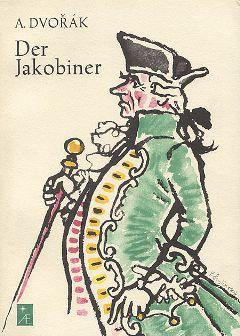Antonin Dvorak - Der Jakobiner (2012)
Antonin Dvorak - Der Jakobiner (2012)

1. Akt I 2. Akt II 3. Akt III Graf Wilhelm von Harasov (Bass)… Jan Martinik Bohus, sein Sohn (Bariton)… Svatopluk Sem Julia, dessen Gattin (Sopran)… Dana Buresova Adolf, Neffe des Grafen (Bariton)… Jiri Hajek Burgvogt (Bass)… Jozef Benci Jirí (Tenor)… Ales Voracek Benda, Lehrer, Chorleiter und Komponist (Tenor)… Jaroslav Brezina Terinka, seine Tochter (Sopran)… Lucie Fiser Silkenova Lottinka, alte Beschließerin (Alt)… Lynette Alcantara Bürger, Bürgerinnen, Musikanten, Jugend, Wachen, Landleute (Chor) BBC Singers Andrew Griffiths (Chorus master) Trinity Choir School David Swinson (chorus-master) Kenneth Richardson (Director) Trinity Boys Choir David Swinson (chorus-master) BBC Symphony Orchestra Jiri Belohlavek (Conductor)
Dvorák set two librettos by Marie Èervinková-Riegrová, completing the first of these, Dimitrij, in 1882. The other, Jakobin was written expressly for the composer. Dvorák had Jakobin in hand as early as 1883, but waited several years before composing, noting in a letter to the librettist that he first wanted to show it to the critic Eduard Hanslick (1825 - 1904). Dvorák hesitated further because he wasn't sure it was a work that would bring him international recognition, owing to the Bohemian setting. In late 1887, however, he decided to proceed with the opera, apparently because the character Benda reminded him of Antonín Leihmann, a church organist and German teacher at Dvorák's school in Zlonice. He finished the score on November 18, 1888, and the first performance took place in the Prague National Theater on February 12, 1889.
Jakobin was neither a failure nor a great success. In 1894, Dvorák asked Èervinková-Riegrová to make revisions, which the composer incorporated into the opera in 1897. Nearly all of Dvorák's changes were for Act III; consequently, this part of the opera is in a more mature style than are the first two acts. Important structural changes, such as moving a duet for the characters Benda and Count Vilém to the third act, proved to make the revised opera a success at its premiere on June 19, 1898. It is this form of Jakobin that survives.
Jakobin is through-composed, with numbers, and features motivic unification and references. The most prominent of the motives forms part of a lullaby sung by Julie, Bohuš's wife. This comes to be associated with Bohuš, as it is the lullaby his mother sang to him as a child. This fragment of the lullaby appears in few, but important, moments in the opera. The way Dvorák blends elements in the numbers of the opera is impressive. For example, in the first act, Filip, the count's steward, tries to woo Terinka, Benda's daughter. In the midst of his clumsy courting, a chorus of men in the town square mock him, blending elements of aria and chorus in a comic atmosphere typical of the lighthearted first act.
A type of musical play-within-a-play concept is integral to the second act, as Benda rehearses an instrumental serenade to be performed later in the count's home. Its rustic melody sets it apart from the music of the opera per se, and Dvorák adds effects such as the tuning of violins for a touch of realism. Music is also the subject of the duet, "My cizinou jsme bloudili" (We wandered in foreign lands), in which Bohuš and Julie convince Benda to allow them to take shelter at the school.
Music plays an important role in the third act as well. Count Vilém, who believes his son is a Jacobin and refuses to reconcile with him, is swayed by the sound of "Synáèku mùj kvìte" (Little son, my flower), the lullaby his dead wife used to sing to his son. --- John Palmer, Rovi
download: uploaded yandex 4shared mediafire solidfiles mega zalivalka filecloudio anonfiles oboom








